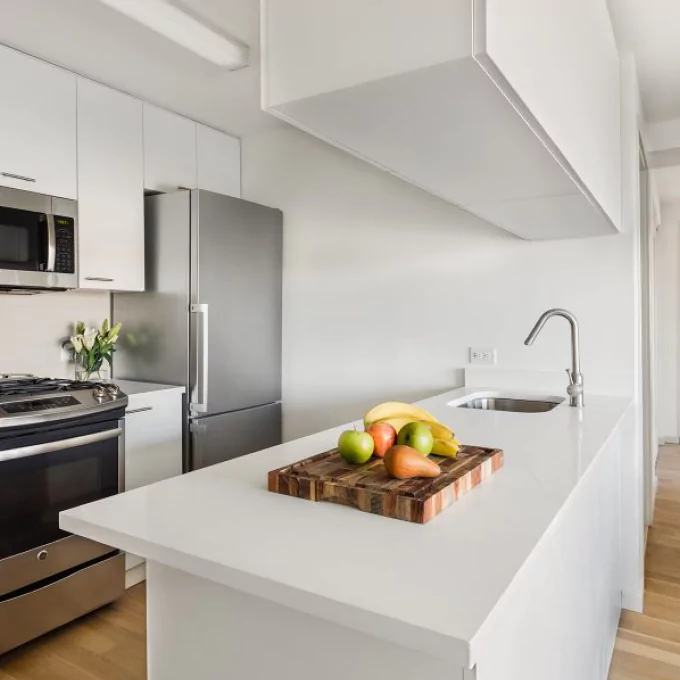Renovating a condo or co-op in New York City is an exciting venture that can significantly enhance your living space and property value. However, the process is fraught with unique challenges, regulations, and considerations distinct to the city's dense urban landscape and its complex real estate environment. Whether you're updating a kitchen, adding a bathroom, or undertaking a full apartment makeover, understanding the ins and outs of the renovation process is crucial for a smooth and successful project. This guide dives into the essential aspects of renovating in NYC, with a spotlight on the critical role of alteration agreements and the nuances between condo and co-op renovations.

Condo Renovation, UWS, NYC
Understanding the alteration agreement
An alteration agreement is pivotal for renovating an apartment in a condo or co-op building. It formalizes the terms under which you can proceed with your renovation project, acting as a safeguard for both you and the building's community. While both condos and co-ops use alteration agreements, their specific terms can vary between buildings and associations.
Key components of an alteration agreement
- Scope and approval of work: This section outlines what renovations are permitted, detailing the project's scope and any necessary approvals from the board or management.
- Timing and scheduling: It specifies when renovations can occur, including allowable days and times, to minimize disruptions to neighbors.
- Insurance requirements: The agreement mandates specific types and amounts of insurance coverage to protect against potential damage or liability. Confirm with your General contractor that he has sufficient insurance to work in the building.
- Compliance with laws: It ensures all renovations comply with local building codes, regulations, and any building-specific rules.
- Financial obligations: Details on any fees, deposits, or repair funds required to cover the administrative costs or potential damages incurred during the renovation process.
- Required completion date: A crucial component, this section outlines the timeline for your project, typically allowing 120 days to complete the work. Failure to meet this deadline can result in work being halted, emphasizing the importance of efficient project management.
Adhering to the alteration agreement is non-negotiable; failure to comply can lead to legal issues, fines, or being required to undo the renovations at your expense. Hence, thoroughly reviewing this document with a professional before starting your renovation journey is important.

Condo Renovation, UWS, NYC
Things to consider when renovating in NYC
- Approval processes: Both condos and co-ops require board approval for renovation plans, demanding a clear understanding of the specific approval process and submission deadlines for your building. Approval timelines can significantly vary, with simpler projects potentially taking weeks to a month for approval, while more extensive, full gut renovations may require several months. Being aware of these timelines is crucial for planning your renovation project effectively.
- Building restrictions: Familiarize yourself with any restrictions on materials, design, or construction methods outlined in your building's alteration agreement.
- Neighbor considerations: Given the close quarters of NYC living, consider how your project might impact your neighbors, and take steps to minimize noise, dust, and other disruptions.
- Soundproofing: ensuring privacy and minimizing noise transfer between units is a priority. Incorporating soundproofing materials into walls, floors, and ceilings is mandatory in most buildings.
- Hiring professionals: Engaging contractors, architects, and designers familiar with NYC's unique renovation landscape and its regulatory environment is crucial.
- Permits and legalities: Determine which permits you'll need from the NYC Department of Buildings or other agencies and ensure your project complies with all applicable laws and regulations.
- Load letter for appliance upgrades: For renovations adding high-power appliances, a load letter from a certified electrician is crucial. It confirms your electrical system's capacity, ensuring safety and compliance.
- Wet Over Dry Rule: When planning a renovation, especially in multi-story buildings, it's essential to consider the "wet over dry" rule. This guideline dictates that areas with significant water usage, such as kitchens and bathrooms, should not be situated above dry living spaces like bedrooms or living rooms in the units below.
Condo vs. co-op: Understanding the differences
While condos and co-ops share many renovation considerations, there are key differences in their governance and approval processes that can impact your renovation project:
- Approval Process: Co-op boards are typically more strict in their approval process, often requiring more detailed plans and sometimes even board interviews. Condos, while still requiring approval, usually have a more lenient process.
- Scope of Work: Co-ops may impose more restrictions on the types of renovations allowed, particularly those affecting the building's structure or systems. Condos might offer more flexibility in terms of the scope of permissible work.
- Ownership Structure: In a co-op, you own shares in a corporation that owns the building, not your apartment directly. This distinction can influence the extent of renovations allowed, as the co-op board acts to protect the interests of all shareholders. In contrast, condo ownership is real property, giving you more autonomy over your unit.

Renovating a co-op and condo in NYC demands expert navigation through complex regulations and meticulous planning. This is where Chapter steps in. As a New York-based design-and-build company, we specialize in seamlessly managing every aspect of your renovation project. From initial planning, architecture, and interior design to the final construction, our all-inclusive service means you don’t have to juggle multiple contractors or worry about the building approval process. We handle it all in-house. With Chapter, you’re not just getting a renovation; you’re getting peace of mind, knowing every detail is taken care of by a team that knows how to turn your dream space into reality efficiently and effectively.